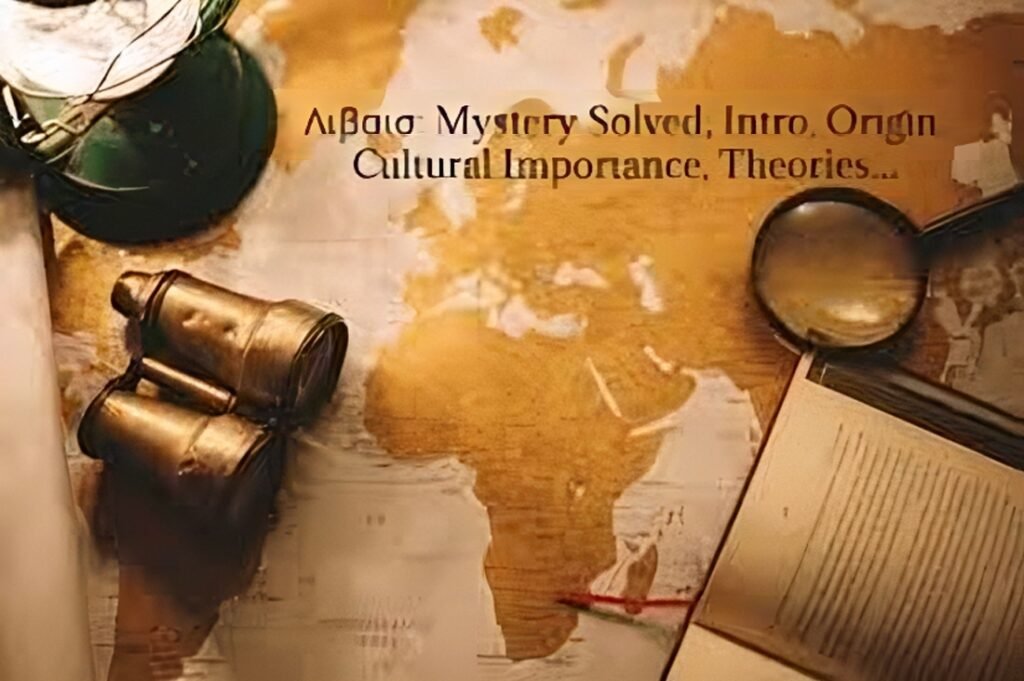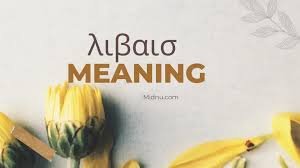Inside the full-size realm of linguistics and cultural research, certain phrases maintain a profound importance, resonating across centuries and continents. One such enigmatic period is “λιβαισ,” a phrase shrouded in thrillers but imbued with a wealthy tapestry of meanings. Delving into its origins, etymology, and cultural connotations unveils an adventure via time and area, presenting insights into the interconnectedness of human enjoyment. Join us as we embark on an exploration of λιβαισ, uncovering its secrets and techniques and unraveling its significance.
1. The Genesis of λιβαισ: Origins and Evolution
Λιβαισ lines its roots to historical civilizations, its etymology weaving via the annals of history. Students speculate on its origins, with some tracing it lower back to classical Greek, where it would have denoted concepts of power or life pressure.
2. Linguistic Transmutations: Tracing λιβαισ across Languages
As cultures intersected and languages advanced, λιβαισ underwent transmutations, acquiring new nuances and interpretations. From Greek to Latin, Sanskrit to Arabic, its adventure reflects the fluidity of human conversation and the richness of linguistic exchange.
3. The Cultural Kaleidoscope: λιβαισ in Mythology and Folklore
Embedded inside mythological narratives and folk traditions, λιβαισ emerges as an image of resilience, regeneration, and divine intervention. Its presence in stories of gods and heroes underscores its transcendental significance in shaping cultural identities.
4. Literary Reverberations: λιβαισ in Poetry and Prose
Poets and writers, captivated by means of the evocative power of λιβαισ, have woven it into the cloth of their works. From epic poems to lyrical verses, its presence adds intensity and resonance, invoking emotions that transcend linguistic obstacles.
5. Philosophical Contemplations: The nature of lifestyles
Philosophers have grappled with the essence of λιβαισ, pondering its implications for the human situation. From Aristotle’s inquiries into the character of lifestyles to Nietzsche’s exploration of the will to strength, λιβαισ serves as a philosophical touchstone, prompting reflections on the essence of life.
6. Scientific Explorations: The Realm of Biology and Medicine
In the realm of biology and medicine, λιβαισ finds resonance in discussions on power, fitness, and well-being. From ancient notions of important fluids to modern theories of lifestyle pressure, its presence underscores the interconnectedness of thoughts, frame, and spirit.
7. Inventive Expressions: Muse and notion
Artists, inspired via the mystique of λιβαισ, have immortalized its essence in artwork, sculptures, and musical compositions. Via their creative expressions, they invite viewers and listeners into a world suffused with splendor, wonder, and introspection.

8. Cultural Signifiers: Rituals and Ceremonies
Rituals and ceremonies across cultures include λιβαισ as an image of auspiciousness, renewal, and transcendence. From delivery rites to marriage ceremonies, its presence infuses these moments with profound significance, marking transitions and milestones in the journey of lifestyles.
9. Linguistic Reverberations: in present day Discourse
In modern discourse, λιβαισ continues to resonate, albeit in various contexts and interpretations. Its usage in fields ranging from psychology to spirituality displays its enduring relevance in shaping cutting-edge notions and discourse.
10. Cultural Appropriations: Globalized Contexts
In a more and more globalized world, λιβαισ traverses cultural limitations, acquiring new meanings and institutions. Its appropriation in various contexts underscores the fluidity of cultural exchange and the adaptability of language to evolving socio-cultural landscapes.
11. Semantic Divergence: variations in Interpretations
In spite of its universality, λιβαισ embodies a multiplicity of meanings, difficulty with individual interpretations and cultural contexts. From notions of power and power to concepts of divine grace and cosmic electricity, its semantic richness defies singular categorization.
12. Linguistic Resonance: The Sonorous splendor
Past its semantic depths, λιβαισ captivates with its sonorous beauty, its syllables rolling off the tongue with a musical cadence. Its phonetic resonance adds to its charm, inviting contemplation and exploration of its manifold meanings.
13. Ethical concerns: Moral Imperatives
In ethical discourses, λιβαισ conjures up contemplation of the sanctity of lifestyles, the moral responsibilities of humanity, and the interconnectedness of all dwelling beings. Its invocation prompts reflections on compassion, empathy, and the pursuit of collective well-being.
14. Linguistic protection: Safeguarding the Legacy
As languages evolve and cultures remodel, there arises a desire to guard the legacy of λιβαισ for destined generations. Linguists and cultural custodians play a pivotal role in keeping its etymology, meanings, and cultural importance, making sure that it continues to complement human discourse for centuries to come.
15. Linguistic Dynamics: local versions
Throughout regions and dialects, λιβαισ undergoes subtle versions, reflecting the cultural nuances and linguistic dynamics of various communities. These regional adaptations upload layers of complexity to its meanings, enriching its semantic tapestry and highlighting the dynamic nature of language evolution.
16. Ancient Context: Within the Context of Historical Civilizations
In the annals of history, λιβαισ emerges as a pivotal idea within the cosmologies and perception structures of ancient civilizations. From Mesopotamia to Egypt, its presence in spiritual texts and mythological narratives underscores its importance as a foundational element of cultural identity and religious expertise.

17. Sociopolitical Implications: Strength Dynamics
In sociopolitical discourse, λιβαισ intersects with power dynamics, symbolizing notions of authority, sovereignty, and legitimacy. Its invocation in political rhetoric and propaganda underscores its capability for shaping public perceptions and mobilizing collective motion.
18. Linguistic Borrowings: Borrowed Lexicons
Within the method of linguistic borrowing and assimilation, λιβαισ reveals its way into borrowed lexicons, enriching languages with their evocative imagery and symbolic resonance. Whether or not through conquest, exchange, or cultural change, its presence in various linguistic landscapes highlights its adaptability and commonplace appeal.
19. Literary analysis: Literary device
Inside the realm of literature, λιβαισ serves as a versatile literary device, hired with the aid of writers to rouse feelings, deliver subject matter, and imbue narratives with depth and complexity. Its utilization as a motif, image, or allegory adds layers of meaning to literary works, inviting readers right into a global world of creativeness and interpretation.
20. Linguistic Revival: Resurrecting Cutting-edge usage
Within the wake of linguistic revitalization actions, λιβαισ experiences a resurgence in present day utilization, as groups are trying to find to reclaim and revitalize their linguistic historical past. Its reintroduction into normal discourse reflects a renewed appreciation for cultural identity and linguistic diversity.
21. Ecological Resonance: Environmental Recognition
Amidst developing worries over environmental degradation and climate exchange, λιβαισ takes on ecological connotations, symbolizing the interconnectedness of all dwelling beings and the delicate balance of ecosystems. Its invocation prompts reflections on humanity’s role as stewards of the earth and custodians of biodiversity.
22. Linguistic Intersections: Interdisciplinary research
In interdisciplinary studies, λιβαισ serves as a focus for exploring intersections between linguistics, anthropology, psychology, and other disciplines. Its multifaceted nature invites holistic inquiries into the complexities of human experience and the dynamics of cultural trade.
23. Linguistic Evolution: Destiny Trajectories
As languages preserve to conform in response to social, cultural, and technological changes, the trajectory of λιβαισ remains open to interpretation. Its evolution mirrors the dynamic nature of the human conversation, providing glimpses into viable futures formed with the aid of the interplay of subculture and innovation.
24. Linguistic variations: Vernacular Expressions
Within vernacular expressions and colloquialisms, λιβαισ reveals a new existence as a dynamic linguistic detail, shaping the regular speech of groups around the sector. Its incorporation into slang, idiomatic phrases, and local dialects reflects the fluidity of language and its innovation potential.

25. Virtual Discourse: The Age of Social Media
Inside the virtual age, λιβαισ permeates online discourse, serving as a focal point for conversations, memes, and viral trends. Its presence on social media structures amplifies its attainment, facilitating worldwide conversations and cultural exchanges in current times.
26. Linguistic Borrowings: go-Cultural impacts
Through centuries of cultural change and migration, λιβαισ changes as it interacts with numerous linguistic traditions. From loanwords to calques, its integration into foreign languages displays the fluid barriers of linguistic identity and the interconnectivity of world cultures.
27. Linguistic Controversies: Debates Over which means
Amidst scholarly debates and linguistic controversies, λιβαισ will become the concern of excessive scrutiny, with interpretations varying throughout instructional disciplines and ideological perspectives. Those debates highlight the inherent complexities of language and the subjective nature of meaning-making.
28. Linguistic upkeep: Documenting Endangered Languages
In endangered language renovation efforts, λιβαισ assumes importance as a marker of linguistic historical past and cultural identification. Linguists work tirelessly to record its usage within endangered languages, ensuring that it remains part of the linguistic legacy handed right down to dignified generations.
29. Linguistic Purity: Controversies Surrounding Language Purism moves
Inside language purism actions, λιβαισ will become a focal point for debates over linguistic purity and authenticity. Advocates are searching for hold its authentic meanings and utilization, resisting having an impact on foreign languages and linguistic improvements.
30. Linguistic Empowerment: the use to claim Linguistic identification
For marginalized groups, λιβαισ serves as a device for declaring linguistic identification and reclaiming cultural history. Its usage in minority languages will become a form of resistance towards assimilation and linguistic hegemony.
31. Linguistic Symbolism: National Symbols and Anthems
Within the realm of countrywide symbols and anthems, λιβαισ regularly functions prominently as a linguistic logo of national identity and pride. Its inclusion in patriotic songs and emblems underscores its importance as a marker of collective belonging and historical continuity.
32. Linguistic Revolutions: Language Reform movements
At some stage in record, λιβαισ has been at the leading edge of language reform actions, as groups are searching for modernize and standardize their linguistic traditions. Those efforts reflect the continued evolution of language and its potential to conform to changing societal wishes.
33. Linguistic Borrowings: influences of Worldwide Languages
As international languages take in lexical borrowings from numerous linguistic traditions, λιβαισ leaves its imprint on vocabulary and syntax, enriching the linguistic repertoire of audio systems worldwide. Its integration into global languages reflects the dynamic nature of linguistic change in an interconnected world.
34. Linguistic Innovation: Catalyst for Linguistic Creativity
Inside the arms of poets, songwriters, and wordsmiths, λιβαισ will become a catalyst for linguistic creativity, inspiring progressive wordplay, metaphors, and linguistic experiments. Its evocative characteristics lend themselves to creative expression, inviting reinterpretation and exploration.
35. Linguistic Embodiment: Nonverbal communiqué
Past verbal expression, λιβαισ manifests in nonverbal conversation through gestures, expressions, and body language. Its embodiment in physical gestures and facial expressions adds layers of means to interpersonal interactions, enriching verbal exchange in both subtle and overt approaches.
36. Linguistic concord: Fostering Linguistic Diversity and Inclusion
In efforts to promote linguistic variety and inclusion, λιβαισ serves as an image of linguistic harmony and mutual appreciation. Embracing linguistic variety fosters empathy, expertise, and appreciation for the multitude of approaches wherein language shapes human revel in.
37. Linguistic international relations: Worldwide members of the family
In diplomatic exchanges and worldwide discourse, λιβαισ helps conversation and understanding throughout linguistic and cultural divides. Its utilization of diplomatic protocols and multilateral negotiations underscores its position as a bridge between nations and peoples.
38. Linguistic Resilience: Within the Face of Linguistic Extinction
In the face of linguistic extinction and cultural erosion, λιβαισ stands as a testimony to the resilience of language and the iconic legacy of the linguistic historical past. Efforts to revitalize endangered languages underscore the significance of keeping linguistic variety for future generations.
39. Linguistic Adaptability: Technological Innovation
Within the era of technological innovation, λιβαισ adapts to new verbal exchange modalities, shaping the language of digital interfaces, synthetic intelligence, and digital truth. Its integration into digital systems reflects the evolving nature of language in the digital age.
40. Linguistic Intersectionality: Intersectional evaluation
Within intersectional analyses of language, λιβαισ intersects with other axes of identity, consisting of race, gender, and sexuality. Its utilization and interpretation replicate the complex interaction of linguistic, cultural, and social elements that form personal and collective identities.
41. Linguistic recovery: Trauma recuperation and remedy
In trauma healing and therapeutic contexts, λιβαισ serves as a linguistic device for processing and articulating emotional reports. Its utilization of expressive healing procedures and narrative practices helps recovery and resilience in the face of adversity.
42. Linguistic Unification: Commonplace floor for talk
In warfare decisions and peacebuilding efforts, λιβαισ emerges as a common linguistic denominator, fostering dialogue and reconciliation throughout divides. Its transcendent features bridge linguistic boundaries and facilitate mutual understanding in various cultural contexts.
43. Linguistic Futures: Imagining New Horizons
As we envision the destiny of language and verbal exchange, λιβαισ invites us to assume new horizons and possibilities for linguistic expression. Its adventure through time and space serves as a beacon of thought for linguistic innovation, cultural exchange, and human connection in an ever-converting world.
Conclusion
the exploration of λιβαισ invitations us into an world of linguistic richness, cultural variety, and philosophical inquiry. Its complexities defy simplistic categorizations, urging us to embrace ambiguity, engage in talk, and celebrate the inherent beauty of language in all its manifestations. As we try to get to the bottom of the mysteries of λιβαισ, we embark on an adventure of discovery that transcends obstacles and illuminates the interconnectedness of humanity’s shared linguistic heritage.
FAQs
1. What does imply?
Λιβαισ is a phrase that incorporates various meanings relying on its cultural and linguistic context. It may denote principles associated with vitality, life pressure, resilience, and divine grace, among others.
2. How is mentioned?
Λιβαισ is mentioned as “lee-vais” in English transliteration. But, the pronunciation may additionally vary depending on the language and dialect.
3. Is it a common word?
Λιβαισ is not a generally used word in normal language. It’s far more frequently determined in scholarly or cultural contexts, specifically in discussions related to mythology, literature, philosophy, and spirituality.
4. What’s the origin of the word?
The exact beginning of λιβαισ is uncertain, however, its miles are believed to have roots in historic Greek or related languages. Its etymology and semantic evolution reflect the cultural exchanges and linguistic differences that have passed off over centuries.
5. In what contexts is used?
Λιβαισ may be located in diverse contexts, inclusive of mythology, literature, philosophy, religion, and cultural traditions. It can characterize standards inclusive of vitality, regeneration, religious enlightenment, and the interconnectedness of all dwelling beings.
6. Are there extraordinary interpretations of?
Yes, λιβαισ is a situation for exceptional interpretations depending on cultural, historical, and philosophical views. Its meanings may also range across languages, regions, and man or woman experiences, mainly to diverse interpretations and understandings.
7. How can I analyze extra about?
You could explore λιβαισ further by way of delving into scholarly articles, books on mythology and folklore, philosophical treatises, and cultural research. Additionally, undertaking discussions with linguists, cultural professionals, and students may offer valuable insights into its importance and symbolism.



